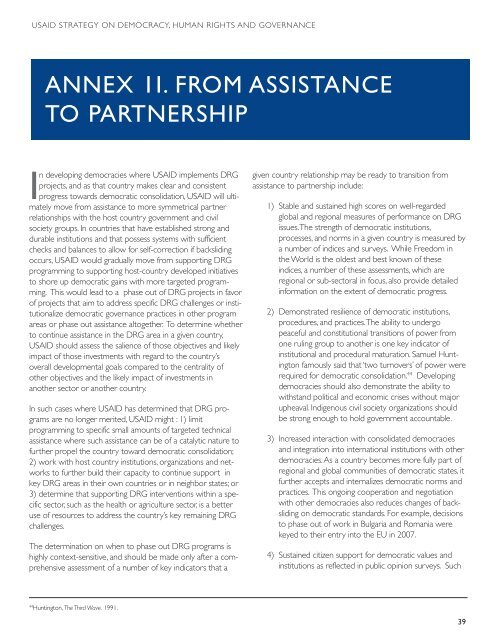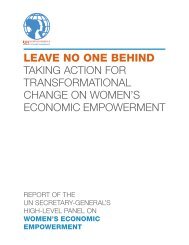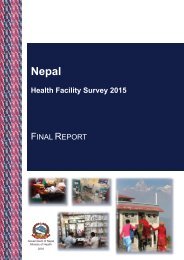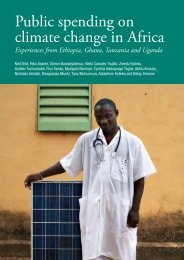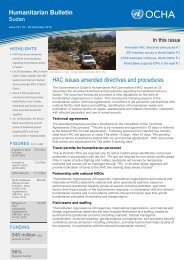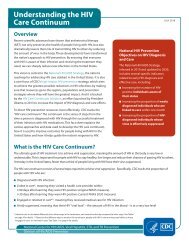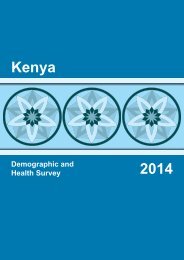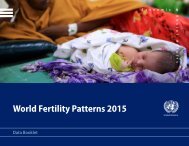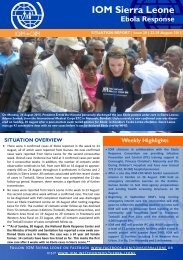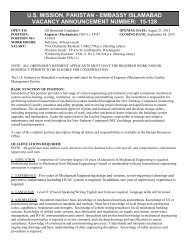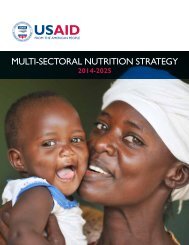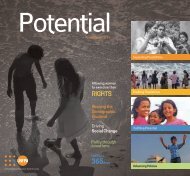USAID DRG_ final final 6-24 3 (1)
USAID DRG_ final final 6-24 3 (1)
USAID DRG_ final final 6-24 3 (1)
Create successful ePaper yourself
Turn your PDF publications into a flip-book with our unique Google optimized e-Paper software.
<strong>USAID</strong> STRATEGY ON DEMOCRACY, HUMAN RIGHTS AND GOVERNANCEANNEX 1I. FROM ASSISTANCETO PARTNERSHIPIn developing democracies where <strong>USAID</strong> implements <strong>DRG</strong>projects, and as that country makes clear and consistentprogress towards democratic consolidation, <strong>USAID</strong> will ultimatelymove from assistance to more symmetrical partnerrelationships with the host country government and civilsociety groups. In countries that have established strong anddurable institutions and that possess systems with sufficientchecks and balances to allow for self-correction if backslidingoccurs, <strong>USAID</strong> would gradually move from supporting <strong>DRG</strong>programming to supporting host-country developed initiativesto shore up democratic gains with more targeted programming.This would lead to a phase out of <strong>DRG</strong> projects in favorof projects that aim to address specific <strong>DRG</strong> challenges or institutionalizedemocratic governance practices in other programareas or phase out assistance altogether. To determine whetherto continue assistance in the <strong>DRG</strong> area in a given country,<strong>USAID</strong> should assess the salience of those objectives and likelyimpact of those investments with regard to the country’soverall developmental goals compared to the centrality ofother objectives and the likely impact of investments inanother sector or another country.In such cases where <strong>USAID</strong> has determined that <strong>DRG</strong> programsare no longer merited, <strong>USAID</strong> might : 1) limitprogramming to specific small amounts of targeted technicalassistance where such assistance can be of a catalytic nature tofurther propel the country toward democratic consolidation;2) work with host country institutions, organizations and networksto further build their capacity to continue support inkey <strong>DRG</strong> areas in their own countries or in neighbor states; or3) determine that supporting <strong>DRG</strong> interventions within a specificsector, such as the health or agriculture sector, is a betteruse of resources to address the country’s key remaining <strong>DRG</strong>challenges.The determination on when to phase out <strong>DRG</strong> programs ishighly context-sensitive, and should be made only after a comprehensiveassessment of a number of key indicators that agiven country relationship may be ready to transition fromassistance to partnership include:1) Stable and sustained high scores on well-regardedglobal and regional measures of performance on <strong>DRG</strong>issues.The strength of democratic institutions,processes, and norms in a given country is measured bya number of indices and surveys. While Freedom inthe World is the oldest and best known of theseindices, a number of these assessments, which areregional or sub-sectoral in focus, also provide detailedinformation on the extent of democratic progress.2) Demonstrated resilience of democratic institutions,procedures, and practices.The ability to undergopeaceful and constitutional transitions of power fromone ruling group to another is one key indicator ofinstitutional and procedural maturation. Samuel Huntingtonfamously said that ‘two turnovers’ of power wererequired for democratic consolidation. 44 Developingdemocracies should also demonstrate the ability towithstand political and economic crises without majorupheaval. Indigenous civil society organizations shouldbe strong enough to hold government accountable.3) Increased interaction with consolidated democraciesand integration into international institutions with otherdemocracies.As a country becomes more fully part ofregional and global communities of democratic states, itfurther accepts and internalizes democratic norms andpractices. This ongoing cooperation and negotiationwith other democracies also reduces changes of backslidingon democratic standards. For example, decisionsto phase out of work in Bulgaria and Romania werekeyed to their entry into the EU in 2007.4) Sustained citizen support for democratic values andinstitutions as reflected in public opinion surveys. Such44Huntington, The Third Wave. 1991.39


